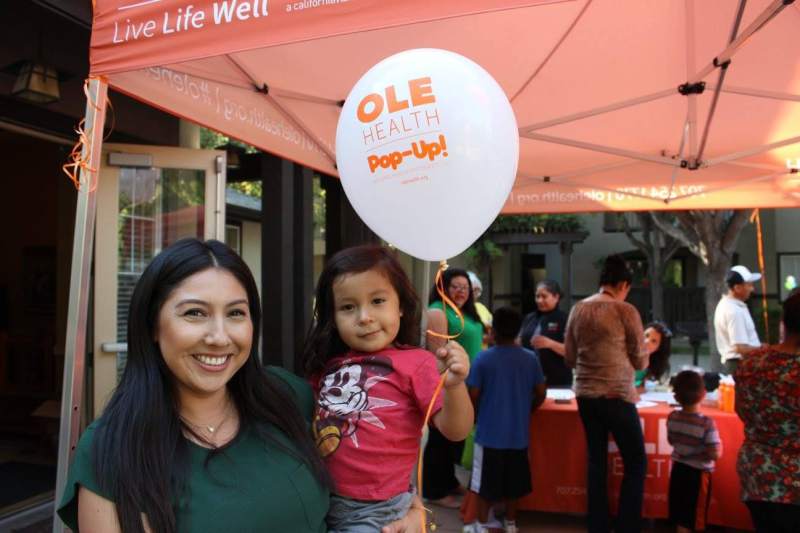NAPA, CA | By CYNTHIA SWEENEY | NORTH BAY BUSINESS JOURNAL | September 14, 2017
Original article can be found at: http://www.petaluma360.com/
____
Farm workers toiling in the vineyards suffer maladies like sun damage, back pain, high blood pressure, poison oak, asthma, and more serious conditions like hernias and pterygium, a condition where scar tissue forms on the eyes due to sun exposure.
But, they don’t always go to a doctor. Reasons range from not being able to take time off from work, no transportation, fear of deportation, or are afraid it will cost too much.
“There is a lot of fear out there in general,” said Fernando Diaz, director of communications at OLE Health.
Because of that, health organizations in the wine-producing regions of Napa and Sonoma counties go to where the workers are.
In Sonoma County, St. Joseph Mobile Health clinic, in affiliation with Santa Rosa memorial and Petaluma Valley hospitals, stops in Cloverdale, Healdsburg, Windsor and Sonoma. During vineyard harvest, the clinics park near a farm work housing complex in Sonoma Valley.
All of the services at the mobile clinics are free. (While full-time farm workers are offered health insurance, seasonal workers usually are not.)
Staff evaluate and treat minor medical conditions, perform preventive health screenings and basic health maintenance like blood glucose, blood pressure, cholesterol, give vaccines and provide information and referrals to community agencies, said Stacy Sterling, benefits operations manager for St. Joseph Health.
Last year, the mobile clinic staffed more than 500 medical visits, and 4,500 dental visits last year.
More serious conditions are referred to a brick and mortar clinic, or to Operation Access, the San Francisco-based organization collaborates with medical professionals to provide donated, outpatient surgical care to the under and uninsured around the North Bay area.
That includes eye care like in Santa Rosa where for the past few years, ophthalmologist Gary Barth has led a team of volunteers at the 4th Street Laser & Surgery Center, providing 30-40 eye surgeries a year to those who couldn’t otherwise afford it, through Operation Access.
The organization is also a primary referral resource for OLE Health, in Napa. Patients are seen for surgeries at Queen of the Valley in Napa, Adventist Health in St. Helena, and Kaiser Permanente in Vallejo, where specialty surgeons donate their time.
OLE Health recently provided services to farmworkers at vineyards in the Napa Valley including Beckstoffer Vineyards and Garvey Family Vineyards at “pop-up health centers.” It provided about 150 medical services including acute care, first-aid and wound care, behavioral health screenings, connections to community resources and educational opportunities. Patients who need further care were referred to OLE Health’s brick-and-mortar clinic.
All services were free of charge.
OLE also gave away materials focused on wellness and occupational health including cooling packets, first-aid kits, sunscreen and cooled lunchboxes.
More than 50 farmworkers and other employees gathered to see a health care provider at Beckstoffer Vineyards. Providers included a medical assistant, a registered nurse and a medical doctor.
“Many of these folks go years without seeing a doctor, having one right outside makes it much more appealing and convenient for them” said Patrisia Vigil, patient services manager at OLE Health. “Thanks to our partners in low-income housing, and in the winemaking community here in the Valley, we’re able to “pop-up” where we’re needed most. We also wanted to make it a fun experience by having giveaways and games for children and families.”
Beckstoffer workers were given notice of the event with their paychecks, and were provided paid time off to attend.
“Otherwise they would probably not be able to go. The workers really love it, and they can bring their families,” said David Beckstoffer, president and COO at Beckstoffer Vineyards.
“A healthy workforce is a strong workforce, and we are happy to host our partners at OLE Health to ensure our staff can take advantage of the chance to speak with a provider and learn more about protecting their health, particularly during this hot summer.”
OLE Health has clinic locations in Napa, St. Helena, Calistoga, and Fairfield. It typically charges for services on a sliding-fee scale based on federal poverty guidelines, and serves more than 33,000 patients a year.
At federally qualified health centers, like OLE Health, patients are required to bring in documentation, like pay stubs, which workers might not have, and that can be a barrier to seeking treatment. They also might not know that services are on a sliding fee scale.
To get farmworkers to come to a clinic, or an outreach location, takes communication strategies to make them feel comfortable and welcome.
OLE Health is currently rebranding its outreach services to make it more visible in the community.
“We wanted to pop-up where we’re needed, so that’s at places like vineyards to work with the farmworkers, or public housing units where we can provide services to families,” said Tanir Ami, CEO at OLE Health.
The pop-up phenomenon builds interest and awareness around a brand, Ami said, by offering a product or service for a limited amount of time, and with limited notice — making the opportunity to obtain the service more exclusive and desirable, as well as engaging in a unique way.
“What we’re doing is taking that same approach to healthcare, if a member of our community has difficulty making it to a health appointment to speak with a provider, we’re able to meet them where they are so that they can take advantage of speaking with a doctor about their health concerns. It creates a sense of urgency and increases the likelihood that those who need care, will come and take advantage of our program,” Ami said.
Aside from the wineries, the pop-up health centers also took place at Silverado Creek Apartments, and Mayacamas Village.
OLE Health has also provides outreach to the county’s three farmworker housing centers.
Earlier this year the organization also provided health screening at two Napa Valley Community Housing locations, providing services for low-income residents, many of whom are farmworkers.
“Our residents include the working families of Napa, who often do not have time during the day to visit the doctor, which can delay much-needed care – the fact that OLE Health will plan their visit with us during the evening hours, drastically increases the access to care available to our community,” said Marlene Santiago, vice president of resident services at Napa Valley Community Housing.
Some received screenings, vaccinations, or were given referrals.
“People were grateful issues were being taken care of one way or another,” Santiago said.
Share this Post













